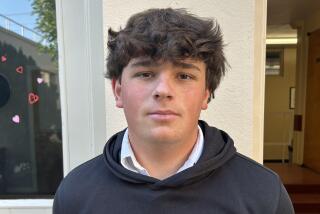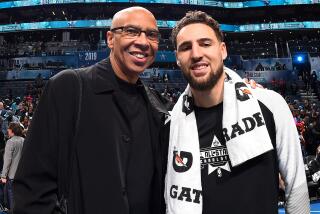Impact as Large as the Man Himself
- Share via
John Thompson resigned as Georgetown’s basketball coach Friday needing only four victories for 600 in his career.
Failing to reach that number shouldn’t keep him out of the basketball Hall of Fame. His story wasn’t about victories. Besides, a good chunk of them came in that soft nonconference schedule containing schools with hyphens and the ever-dangerous St. Leo.
The Hall of Fame measures more than numbers. It’s a reflection of impact, and few loomed larger over the college basketball landscape than Thompson.
He was a pioneer, the first African American coach to win the NCAA championship, and a man who challenged minds just as aggressively as his team’s defenses challenged opposing players.
His team’s style of play wasn’t aesthetically pleasing. But it was effective enough to get him to the NCAA tournament 20 times, and to win six Big East championships.
Thompson the man is as complex as they get: a bully who sticks up for underprivileged people, an educator who limits the flow of information, a capitalist who impedes other who try to do their jobs.
Many people didn’t like Thompson. I covered Georgetown for the Washington Post for two years (the two years Allen Iverson played for Thompson) and he gave me plenty of reasons not to like him.
But I respect him. And even those who don’t respect him listen to him.
He is a commanding presence, a 6-foot-10 black man, with a baritone voice that can back you up against a wall.
He used that voice to speak out against the imposition of standardized test scores for incoming freshmen athletes who came from a variety of backgrounds. Who sets the standards, he wondered? And how fair are standards when the educational opportunities aren’t the same for each student?
He walked off the court before one game and missed another to protest Proposal 42, an NCAA regulation designed to limit scholarship funding for students who did not meet the minimum scores.
Thompson knew the group that would be most adversely affected would be African Americans. So he took a stand.
That’s what made him a hero to a good chunk of black America. At his resignation news conference Friday, he said the proudest moment of his career was “when somebody walked up to me and told me I wore my blackness well.”
Thompson always taught his players to be much more than basketball players, even stopping practices to dispense little lessons in life. Or dance. One time he complained that today’s kids use too much arms and not enough legs when they’re dancing, so he showed them how he did it back in his day.
So I was told. It would have been fascinating to look in on his practice sessions. It also would have been easier to crash a meeting of the Joint Chiefs of Staff.
Thompson built a fortress around his basketball program. He wanted to develop men, but he often protected his players as if they were children. Georgetown’s restrictive media-access policies are legendary among college basketball reporters, as was his policy of staying at out-of-the-way hotels during the NCAA tournament.
He wanted reporters to get all of their information from him, yet he was often inaccessible, practically forcing them to search elsewhere. When they do, as I had to when I called the high school coach of a Georgetown player to see if there was truth to rumors he wanted to transfer, Thompson acted as if it were a major security breach.
If Iverson sprained his ankle, I felt as if I needed Bob Woodward to help me find out if he’d be ready for the next game.
Thompson knew everything about everything related to his team. Everything. And he always seemed to be one step ahead.
During a CBS-televised game at USAir Arena, television commentator Billy Packer referred to Iverson as a “monkey.” Thompson got word of it almost immediately after the game. Thompson walked into his postgame news conference and started telling reporters that he knew Packer and not to brand Packer a racist and most of the guys in the room had no idea what he was talking about.
The thing most people didn’t understand about Thompson was that he stands by those who stand by him. It doesn’t matter what color they are.
People called him racist because his rosters rarely included any white players. He wondered why people were upset with an all-black basketball team at a predominantly white university instead of complaining about the imbalance of an elite, predominantly white university located in the predominantly black city of Washington.
Meanwhile, look who was his top assistant and will now take over the team: Craig Esherick, a white man.
Those he allows to get close to him are like family. When George Raveling was in a car accident that almost took his life in 1994, Thompson dropped everything and went to his bedside.
When Thompson’s team started gaining prominence and the Georgetown radio rights became desirable, he stuck with the guy from a small radio station in Washington who had been with him from the start.
No college coach is as indebted to a single player as much as Thompson is to Patrick Ewing. Thompson’s 1984 NCAA championship and his two other Final Four appearances, which secured Thompson a place on the national stage, came with Ewing at center.
It’s also possible that no college coach stuck by his former pupil the way Thompson did with Ewing. He went to every one of Ewing’s important playoff games with the New York Knicks. If things went badly, or Ewing messed up, Thompson always had public and private words of support.
The number Georgetown liked to trot out was 97% of the players who stayed four years under Thompson received their degrees. That neglected to mention that Thompson was quick to run off players--one even joined the Foreign Legion--when they didn’t fit his agenda or threatened to embarrass the university.
Now it appears as if he ran himself off. He’s going through a divorce, which would have diverted his attention from his struggling team. By resigning, he assured that if the divorce proceedings turn nasty, the dirt will be about John Thompson, not Georgetown University’s basketball coach.
The timing of his announcement was classic Thompson because it came when no one was expecting it. He always liked to keep people off guard.
After 27 years, his coaching days might be done.
Whether he reaches his next milestone, the Hall of Fame, is beyond his control.
Already, his life is different.
J.A. Adande can be reached at his e-mail address: j.a.adande@latimes.com
More to Read
Go beyond the scoreboard
Get the latest on L.A.'s teams in the daily Sports Report newsletter.
You may occasionally receive promotional content from the Los Angeles Times.










